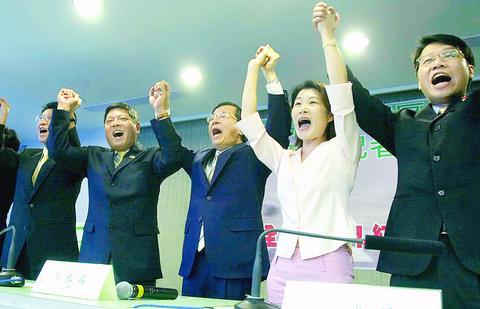President Chen Shui-bian (陳水扁) yesterday crushed speculation that the Democratic Progressive Party (DPP) has set a campaign theme for the legislative elections of terminating a system run by the opposition Chinese Nationalist Party (KMT) Chairman Lien Chan (連戰) and People First Party (PFP) Chairman James Soong (宋楚瑜).
Chen yesterday said the DPP had, over the years, sought to terminate the authoritarian system, but it never meant to terminate the "Lien-Soong system."

PHOTO: CHIANG YING-YING, TAIPEI TIMES
The comments came in response to rumors that began to spread after the DPP's Information and Culture Department Director Cheng Wen-tsan (
"Over the past two decades, we've successfully ended the authoritarian system. Please do not mistake the termination of the authoritarian system with that of the Lien-Soong system ... our goal is to help all of our candidates get elected, so as to achieve majority in the legislature and thus enhance the governability of the administration," Chen told a press conference at DPP headquarters yesterday.
The conference was held to announce the platforms of four candidates, who have decided to run a joint campaign.
Cheng was reported to have told the media on Sunday that the DPP's main goal for the legislative campaign was to terminate the "Lien-Soong system" and the "post-March 20 atmosphere," in which the pan-blue alliance charged the DPP had rigged the presidential election results.
Cheng's comments triggered strong reaction from many party members, who said that the plan undermined the DPP's vision. Some even said Lien and Soong's careers were already destroyed, and it didn't take the DPP to terminate them.
In his capacity as party chairman, Chen yesterday endorsed the joint campaign agreement by the four DPP candidates in Taipei County's 3rd electoral district, where the party has always been outperformed, in the traditionally pro-blue Chungho, Yungho and Hsintien areas.
"The year-end legislative elections can't be won with the victories of individual candidates: our goal is to allow all of our candidates be elected.
Individual candidates should not seek to boost the highest votes for him or herself, rather, everyone should work together towards the goal of securing the legislative majority," Chen said.
The joint campaign by definition means that candidates from the same party agree to campaign as a single ticket, de-emphasize campaigning for individual candidates, and adopt strategies of "vote allocation," which aims to distribute votes evenly between candidates to maximize the number of seats won.
The party yesterday said it would not rule out the possibility that DPP candidates working with its strategic partner the Taiwan Solidarity Union in joint campaigns to seek to maximize the number of seats won by the pan-green camp.
Party officials yesterday also passed a resolution at the Central Executive Committee meeting to demand the passage of the following bills in the upcoming interim legislative sitting: halving the number of legislative seats, reforming the current legislative electoral system into "single-member districts and a two-vote system," enshrining the referendum on the Constitution, as well as abolishing the National Assembly.

‘DENIAL DEFENSE’: The US would increase its military presence with uncrewed ships, and submarines, while boosting defense in the Indo-Pacific, a Pete Hegseth memo said The US is reorienting its military strategy to focus primarily on deterring a potential Chinese invasion of Taiwan, a memo signed by US Secretary of Defense Pete Hegseth showed. The memo also called on Taiwan to increase its defense spending. The document, known as the “Interim National Defense Strategic Guidance,” was distributed this month and detailed the national defense plans of US President Donald Trump’s administration, an article in the Washington Post said on Saturday. It outlines how the US can prepare for a potential war with China and defend itself from threats in the “near abroad,” including Greenland and the Panama

The Chinese Nationalist Party (KMT) is maintaining close ties with Beijing, the Democratic Progressive Party (DPP) said yesterday, hours after a new round of Chinese military drills in the Taiwan Strait began. Political parties in a democracy have a responsibility to be loyal to the nation and defend its sovereignty, DPP spokesman Justin Wu (吳崢) told a news conference in Taipei. His comments came hours after Beijing announced via Chinese state media that the Chinese People’s Liberation Army’s Eastern Theater Command was holding large-scale drills simulating a multi-pronged attack on Taiwan. Contrary to the KMT’s claims that it is staunchly anti-communist, KMT Deputy

RESPONSE: The government would investigate incidents of Taiwanese entertainers in China promoting CCP propaganda online in contravention of the law, the source said Taiwanese entertainers living in China who are found to have contravened cross-strait regulations or collaborated with the Chinese Communist Party (CCP) could be subject to fines, a source said on Sunday. Several Taiwanese entertainers have posted on the social media platform Sina Weibo saying that Taiwan “must be returned” to China, and sharing news articles from Chinese state media. In response, the Mainland Affairs Council (MAC) has asked the Ministry of Culture to investigate whether the entertainers had contravened any laws, and asked for them to be questioned upon their return to Taiwan, an official familiar with the matter said. To curb repeated

Myanmar has turned down an offer of assistance from Taiwanese search-and-rescue teams after a magnitude 7.7 earthquake struck the nation on Friday last week, saying other international aid is sufficient, the National Fire Agency said yesterday. More than 1,700 have been killed and 3,400 injured in the quake that struck near the central Myanmar city of Mandalay early on Friday afternoon, followed minutes later by a magnitude 6.7 aftershock. Worldwide, 13 international search-and-rescue teams have been deployed, with another 13 teams mobilizing, the agency said. Taiwan’s search-and-rescue teams were on standby, but have since been told to stand down, as